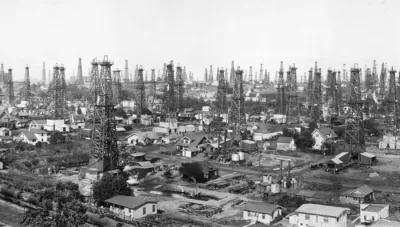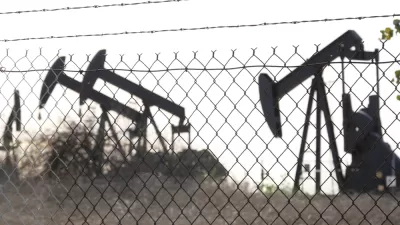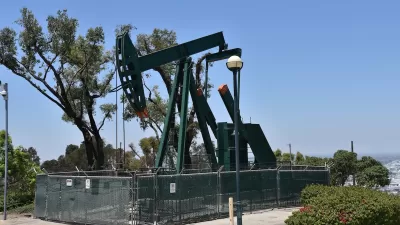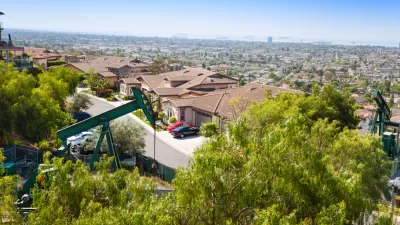Much of California's oil and gas extraction takes place in residential neighborhoods, posing significant health risks to entire communities.

"Every year, upward of 140 million barrels of oil are extracted from the state of California," writes Judith Lewis Mernit for Yale Environment 360. But "unlike more rural oil-producing states, where oilfields might be uninhabited but for the people who work on them, drilling in California happens to a large degree in residential settings."
"In Signal Hill to the south near Long Beach, drilling rigs butt up against playgrounds," while a wall obscures an active oil well just behind the Beverly Center, a posh mall in Los Angeles. "In addition to drilling operations, refineries in the Los Angeles and San Francisco Bay areas, handle some of the dirtiest oil in the world, from Alberta’s Athabasca oil sands to the state’s own carbon-heavy crude," writes Mernit. According to a 2020 analysis by FracTracker Alliance, over 7 million Californians live within a mile of an oil or gas well.
Despite "a mountain of evidence saying that living close to oil and gas wells is harmful to human health," between 2015 and 2020 California "issued more than 25,000 permits for drilling new wells and redrilling older ones, more than 60 percent of them in Spanish-speaking communities." But with "plenty of other culprits for polluted air," the connection is often difficult to prove. A surprising absence of data on the subject "makes it easier for petroleum’s boosters in the state to claim that oil activity does not pose a health hazard for nearby communities, and harder for legislators to protect their constituents from what they insist is making them sick."
Although "Oil industry advocates contend that California has the toughest environmental laws for petroleum extraction in the world," spotty enforcement, low fines, and exemptions for small producers—"the ones in neighborhoods, in people’s backyards"–have led to an unchecked proliferation of wells in residential areas and farms.
In recent years, cities around the country have taken steps to mitigate the impacts of urban oil drilling and limit new wells near homes and schools. "In 2013, the Dallas City Council passed an ordinance prohibiting new drilling within 1,500 feet of sensitive developments," while "[i]n Los Angeles, site of the country’s largest urban oil field, the city council is considering an ordinance to outlaw oil drilling within the city completely." But with oil companies lobbying to block such legislation, advocacy groups express cautious optimism for incremental victories.
FULL STORY: The Oil Well Next Door: California’s Silent Health Hazard

Planetizen Federal Action Tracker
A weekly monitor of how Trump’s orders and actions are impacting planners and planning in America.

Maui's Vacation Rental Debate Turns Ugly
Verbal attacks, misinformation campaigns and fistfights plague a high-stakes debate to convert thousands of vacation rentals into long-term housing.

San Francisco Suspends Traffic Calming Amidst Record Deaths
Citing “a challenging fiscal landscape,” the city will cease the program on the heels of 42 traffic deaths, including 24 pedestrians.

Amtrak Rolls Out New Orleans to Alabama “Mardi Gras” Train
The new service will operate morning and evening departures between Mobile and New Orleans.

The Subversive Car-Free Guide to Trump's Great American Road Trip
Car-free ways to access Chicagoland’s best tourist attractions.

San Antonio and Austin are Fusing Into one Massive Megaregion
The region spanning the two central Texas cities is growing fast, posing challenges for local infrastructure and water supplies.
Urban Design for Planners 1: Software Tools
This six-course series explores essential urban design concepts using open source software and equips planners with the tools they need to participate fully in the urban design process.
Planning for Universal Design
Learn the tools for implementing Universal Design in planning regulations.
Heyer Gruel & Associates PA
JM Goldson LLC
Custer County Colorado
City of Camden Redevelopment Agency
City of Astoria
Transportation Research & Education Center (TREC) at Portland State University
Jefferson Parish Government
Camden Redevelopment Agency
City of Claremont





























